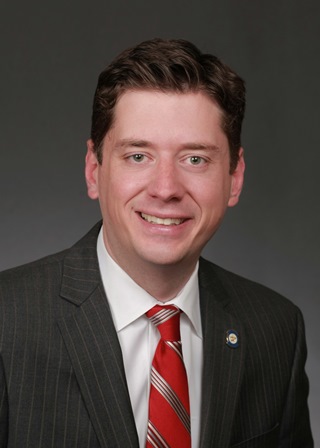In order to provide equal access and equal opportunity to people with diverse abilities, this site has been designed with accessibility in mind. Click here to view
Senator Holt hails 2015 election reforms

Gov. Mary Fallin has signed into law Senate Bill 312, which consolidates local election dates to either one cycle in the spring or one cycle in the fall. This follows the successful adoption of other proposals championed by Sen. David Holt (R-Oklahoma City) to encourage higher voter turnout after dramatic recent declines.
“We took some major steps this year in addressing Oklahoma’s civic participation crisis,” said Holt. “First, we recognized that we have a problem. Second, we passed some important reforms, including online registration and local election consolidation. Having said that, there is much more to do, and I will continue to push the issue. Improving voter turnout is going to be a long process, and the responsibility is by no means limited to policymakers. We all have to take ownership.”
SB 312 also creates a framework that discourages three-step elections at the local level. When only two elections are required to fill a position, it saves taxpayer dollars, minimizes voter fatigue, and reduces the potential reliance on fundraising from special interests.
“We have to get away from the idea that it takes three separate elections to fill one office,” said Holt. “One day, I’d like to see that same vision implemented for all elective offices, but Senate Bill 312 does bring us toward that day at the local level.”
Last year, just 29 percent of eligible Oklahomans turned out to elect the state’s governor. In 2012, Oklahoma notched the third-worst Presidential turnout in the nation. And in 2014, fewer Oklahomans were registered to vote than had been in 1988. In response to these worrying trends, Sen. Holt introduced ten election reform proposals to address various aspects of the current process that discourage participation. Two of those bills became it into law this year, and a third proposal was passed into law by other authors.
SB 312 (Holt/Echols) – Consolidates elections for local elective office to either one cycle in the spring or one cycle in the fall. In Oklahoma City in 2014, school board elections occurred in February and city council elections occurred in March. Such inefficiencies that discourage turnout will no longer be possible with enactment of SB 312. Gov. Fallin signed it into law on June 4.
SB 313 (Holt/Banz) – Creates a secure online system to accept voter registration applications. A third of potential Oklahoma voters are not registered, but SB 313 provides a modern method to combat that problem. Signed by Gov. Fallin on April 17.
HB 2181 (Hickman/Quinn) – Lowers the number of signatures required to recognize a political party (similar to Senator Holt's SB 318). Signed by Gov. Fallin on May 12.
SB 315 (Holt/Hall) also passed the Senate but was not granted a hearing in the House. It allows voters to become permanent absentee voters. Other election reform proposals introduced by Holt, and eligible again for consideration in 2016, include a top two primary system, an all-mail election, modernization of absentee procedures, more opportunities to register, simplification of early voting, and easier ballot access for presidential candidates and initiatives.
 Oklahoma Senate
Oklahoma Senate

